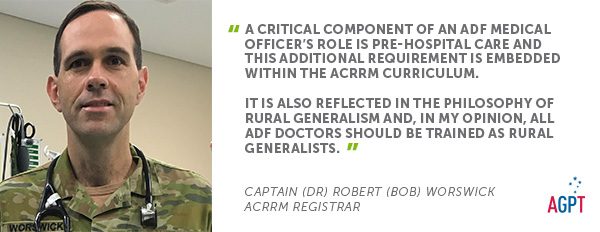Choosing ACRRM for your AGPT career pathway provides you with unique opportunities. Find out more about where rural can take you with Captain (Dr) Robert (Bob) Worswick, Australian Defence Force Medical Officer and ACRRM AGPT registrar.

Full title and name:
Captain (Dr) Robert (Bob) Worswick
Your role in ADF:
Army Medical Officer
Tenure:
I have served in the Army for 31 years. I completed my officer training at the Australian Defence Force Academy (ADFA) and the Royal Military College (RMC) Duntroon, and then served as an infantry officer for 19 years before commencing medical school. I was sponsored by the Army through my medical training. I am now in my third year as an Army Medical Officer.
Why did you choose ACRRM?
As a high school student, I read the book 'To Kill A Mocking Bird'. In the book, Atticus Finch tells Scout that “you never really understand a person until you climb into their skin and walk around in it”. This is often misquoted as “to walk a mile in another person’s shoes”. I’ve walked many miles in my patients’ shoes, and before I started medicine I had a very clear understanding of what was expected of me as an Army doctor – because it was what I expected from the Army doctor when I was an infantry officer. From my first day as a medical student I knew that I would become an ACRRM registrar, because I knew that training through ACRRM would best prepare me for the challenges that I encounter in my role as an Army doctor.
Why do you think ACRRM’s Fellowship is such a great match for doctors in the ADF?
I am a dual pathway GP registrar – training through both ACRRM and RACGP – and nearing the end of my training for both Colleges. I have a very good appreciation of the similarities and differences in the training and assessment requirements for each of the Colleges. While both Colleges do a good job of training GPs, the ADF needs its doctors to be more than a GP. A critical component of an ADF medical officer’s role is pre-hospital care and this additional requirement is embedded within the ACRRM curriculum. It is also reflected in the philosophy of rural generalism and, in my opinion, all ADF doctors should be trained as rural generalists. Again, both of the Colleges support training of rural generalists, but only ACRRM establishes this as the foundation of its training. I also believe that the ADF and ACRRM share a similar culture based on a bias for action and the shared requirement to prepare doctors to thrive as independent practitioners in a resource-constrained environment.
What is your advice to medical students or young doctors looking to grow their career in the ADF?
Do it! You will spend the next 20, 30 or 40 years of your life as a doctor. You don’t need to rush to become a surgeon, or a physician, or GP, or whatever other specialty takes your fancy. Medicine is as much about the journey as it is the destination. Do something different – take ‘the road less travelled’. For those contemplating becoming a GP, serving as an ADF medical officer while concurrently undertaking GP training is a great option. Each of the three Services – Navy, Army and Air Force – offer opportunities to extend your skills as a GP, through additional training in underwater medicine, pre-hospital and retrieval medicine, and/or aviation medicine. More broadly, a medical career that includes service as a doctor in the ADF – be it full-time or part-time, for a short time or a long time – offers many opportunities and rewards. For me, one of the greatest rewards is the satisfaction of knowing that I have provided the best health care that I can for the young men and women who volunteer to serve our country.
To find out where rural can take you, or to apply for the AGPT program with ACRRM, visit our website.

